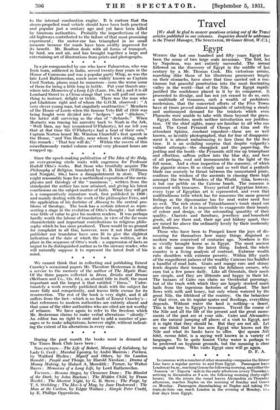Travel
[We shall be glad to answer questions arising out of the Travel articles published in our columns. Inquiries should be addressed to the Travel Manager, The SPECTATOR, 99 Gower Street, W .C.1.]
Egypt
Wining the last one hundred and fifty years Egypt has been the scene of two large scale invasions. The first, led by Napoleon, was not: entirely successful. -The second• followed on the discovery of Egypt in the middle of last century by a Mr. Thomas Cook. His victorious armies, marching (like those of his illustrious precursor) largely on their stomachs, have since that time carried out a con- tinuous but peaceful penetration into the most fascinating valley in the world—that of the Nile. For Egypt rapidly justified the confidence placed in it by its conqueror. It proceeded to divulge, and has not yet ceased to do so, such a multitude of treasures, such a wealth of prehistoric modernism, that the concerted efforts of the Five Towns have at times proved almost incapable of satisfying a steady and undismayed demand for the trinkets which even Pharaohs were unable to take with them beyond the grave.
Egypt, therefore, needs neither introduction nor justifica- tion. Of the chief sights, many are familiar to all who can read. The Great Pyramid of Cheops at Giza and the attendant Sphinx, couchant regardant—these are so well known, so lavishly photographed, that for fear of disappoint- ment it is almost embarrassing to face them for the first time. It is an unfailing surprise that despite vulgarity's valiant attempts—the cheapjack and the paper-bag, the jostling and the booth—the Pyramids still rise up triumphant and effortless, saffron yellow into the blue sky, and best of all perhaps, cool and immeasurable in the light of the full moon. And a close inspection of the masonry, of which the gigantic stones fit so closely and so well that a penknife blade can scarcely be thrust between the unmortared joints, confirms the wisdom of the ancients in classing them high amongst the Seven Wonders of the World. Giza, however, is but one pebble on the Cairene beach. The museum is crammed with treasures. Every period of Egyptian history, every type of Egyptian art is represented, and even that multitudinous tribe which has for museums the same general feelings as the dipsomaniac has for neat water need fear no evil. The rich stores of Tutankhamen's tomb stand out above the rest, for it is impossible to exaggerate their beauty of colour and design, or the astounding quantity of their quality. Chariots and furniture, jewellery and household goods, all are there and, their age and history apart, they are raised far above the ordinarily lovely by their modernity and freshness.
Those who have been to Pompeii 'mow the joys of dis- towering for themselves how many things disguised as modern were conceived of centuries ago. Nowhere is this so vividly brought home as in Egypt. The most ancient is at the same time the latest thing. Indeed, the whole country is a living analysis of contrast. Extreme wealth rubs shoulders with extreme poverty. Within fifty yards of the magnificent palaces of the wealthy Cairenes lies huddled a handful of mud huts. Goats and mangy curs and skinny fowls dispute their tenancy with the fellaheen owners, who earn but a few pence daily. Like all Orientals, their needs are simple, and they are illiterate and happy in their lot. The bazaars of Cairo can claim no Occidental parentage, but of the trash with which they are largely stocked much hails from the ingenious factories of England. The land flows with milk and honey, but only where watered by the great Nile, the lifeblood of the country. On the behaviour of that river, on - its regular spates and floodings, everything depends. Without water the land is nothing—a desert. This is the key to Flypt's treasures. Travel the course of the Nile and all the hfe of the present • and the great monu- ments of the past are at your side. Cairo and Alexandria Are the natural jumping off places of a visit to Egypt, and it is right that they should be. But they are not all. Let no one think that he has seen Egypt who knows not the Nile and what its banks have to offer. Qui aquam Nili bibit, rursus billet, is a saying well known in a variety of languages. To lie quite honest Vichy water is perhaps to be preferred on hygienic grounds, but the meaning is clear enough and true. -Who visits Egypt once will go again.
D. F. A.
* * * *






























 Previous page
Previous page